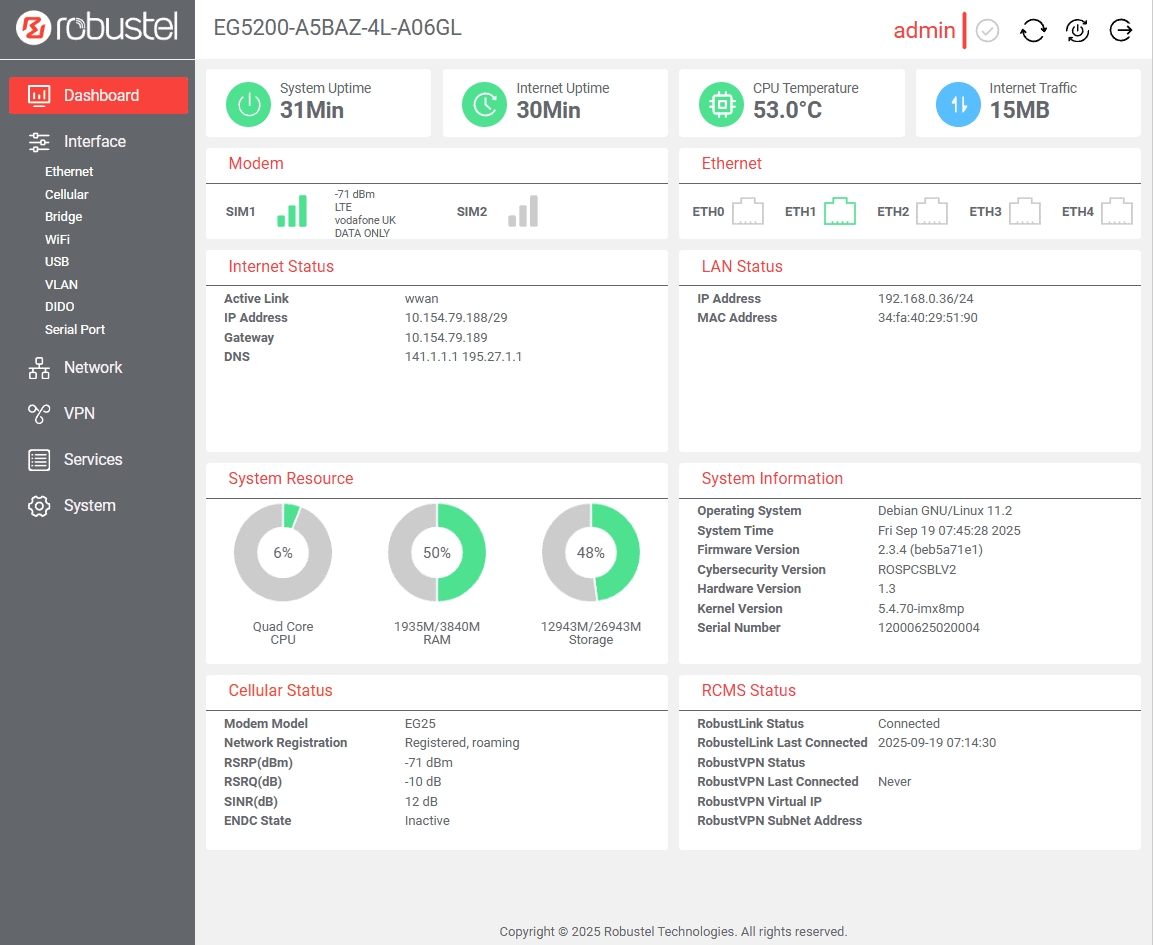RobustOS Pro
Industrial Linux that puts your applications at the edge
RobustOS Pro brings a full Debian environment to Robustel gateways so you can run containers and native Linux applications next to the process, not just in the cloud. Teams use their familiar Linux tools, libraries, and build pipelines, then deploy on proven industrial hardware with router-grade networking underneath. You start locally on a single device with a clear Web Manager and CLI, standardize the way apps start and persist, and roll forward or back with confidence when you’re ready to scale.
Not sure what IoT Operating System is right for your business, click the button below to speak to a Robustel product specialist today

An Industrial Linux Platform Built for Organizations Moving Applications to the Edge
Operations Leaders

Consolidate boxes by running your applications on the Robustel gateway you already trust. Start local on one site, validate performance and recovery, then standardize images and rollbacks so scale is predictable. You get fewer truck rolls and one device to secure, monitor, and support.
Network Engineers

Work with a standard Debian environment while keeping router-grade networking underneath. Pin versions, sign packages, and keep clean upgrade and rollback paths so changes are governed and auditable. RCMS can mirror router workflows at fleet scale; Debian containers and packages remain managed on the device.
Developers & Integrators

Ship containers first, or build native apps with the RobustOS Pro SDK when you need tight integration. Expose settings in the on-device UI, control start-up order and persistence, and use logs and diagnostics to troubleshoot in the field. Port existing Linux code with minimal friction and keep a known-good build for fast rollback.
Why Debian on the Gateway
A standard Linux userland you already know
RobustOS Pro is based on Debian, so devs and integrators can lean on mainstream package managers, libraries, and languages rather than a bespoke embedded stack. That shortens learning curves, speeds up PoCs, and makes vendor hand-offs cleaner because the platform looks and behaves like the Linux your teams use every day.
Built specifically for edge applications, not just routing
Containers and native apps run on the device with explicit control over service ownership, start-up order, and persistence. You decide whether a service is managed by RobustOS Pro (UI/CLI-controlled) or left to a third-party runtime/shell (ideal when you want to treat it like a standard Linux service). Either way, you retain a single point of truth for how the device behaves.
Long service life with a clear security path
Industrial projects live for years. RobustOS Pro follows a 10-year software life-cycle with critical security patches and high-priority fixes available over that horizon; automated security updates are supported when your change-control allows it. That means fewer platform surprises and simpler compliance narratives over time.
Designed to survive edge conditions
Power events, cold boots, and hands-off sites are realities in the field. The filesystem design protects system integrity during upgrades or downgrades and gives you a fast reset-to-default if a build gets messy, so you can always get back to a known-good state without swapping hardware. Flash Manager helps you verify image behavior and flash wear before and after trials.
Developer freedom with structure
Most common languages are welcome (C/C++, Python, Java, Node.js, and more). RobustOS Pro follows the Debian model: from v2.4.0, the system does not enforce app-signature verification. You install from your trusted APT repository or upload a local .deb your supply-chain, your rules. The SDK provides clear hardware interface specifications and integration hooks so releases remain repeatable, documented, and auditable via your change control and RCMS activity logs.
Applications at the Edge — What You Can Run and How It Runs
Start on one device, add the services that matter, and scale when you are ready. RobustOS Pro gives you two clean paths—containers for speed and portability, native apps for tight integration—so IT/OT can choose the right level of control on a per-service basis.
How you run it
- Containers first. Package data collection, protocol translation, local APIs, or analytics as containers using your existing toolchain. On the device you set resources and environment variables, control start order, and decide whether the service is governed by RobustOS Pro (UI/CLI control) or treated as a third-party component managed by its own tooling. This balances central control with developer autonomy.
- Native apps with the SDK. The SDK supports two core scenarios:
(a) Porting & adaptation — bring apps built for general Linux (e.g., Raspberry Pi) onto Robustel hardware. Use the SDK’s hardware interface specs to adapt the I/O layer so your code runs reliably on our platform.
(b) Integration & customization — when you want unified control through the device’s Web Manager and CLI, perform secondary development with the SDK to expose settings, status, and actions in the UI.
Install and update via your APT repo or local .deb upload; manage lifecycle with system services and RCMS rings so changes remain reversible and auditable. - Port existing Linux software. The environment targets ARMv8 across the Robustel gateway portfolio, so many projects can move from popular single-board computers or small embedded PCs with minimal changes—gaining an industrial chassis and router-grade networking underneath.
What you’ll run (and why)
- Data collection and protocol bridging. Poll serial or field buses, normalize values, and forward upstream when links allow. You cut hardware, reduce latency, and keep legacy assets talking to modern systems.
- Local APIs and control services. Expose a small HTTP or gRPC API for site logic or third-party tools so decisions happen on site even during backhaul interruptions.
- Data reduction and edge analytics. Filter, deduplicate, and score events before sending to the cloud. You save bandwidth and improve response times without changing upstream systems.
- Event handling and alarms. Trigger actions from I/O, serial, or application states and log outcomes for audit. Local responses stay fast and predictable.
- LoRaWAN forwarders (on supported models). Forward packets to your chosen network server without adding another box—keeping radio, routing, and applications in one device.
Take your Local Workflow to the Cloud
Everything you do on the device can be mirrored in RCMS with the same menus and logic. Schedule upgrades, push configurations, monitor health, and run diagnostics across one site or thousands without changing how you work locally.
Secure Inside & Out
You manage application security on the device; Robustel secures the platform it runs on. The result is a balanced model where local control and external assurance work together.
Secure on the Inside (your controls)
RobustOS Pro ships with a hardened networking stack and policy controls designed for enterprise IT and OT realities. You set access at the edge with firewall zones, role-based administration, and encrypted management paths.
- Management access you can lock down. Enable HTTPS and SSH only where needed, tie them to your own certificates, and restrict who can reach the Web Manager or CLI.
- Firewall and zones. Control forwarding between LAN, WAN, and other zones; decide whether the device responds to ping; keep a clean separation between segments.
- Standards-based VPN. Use IPsec and OpenVPN with your own CAs, keys, and CRLs. The built-in Certificate Manager centralizes files for fast deployment and audit.
- Logs and diagnostics for audits. Generate and download system journals and diagnostic bundles to support change reviews and incident response.
Debian-native hardening (the foundation)
RobustOS Pro is built on Debian for predictable maintenance, signed software delivery, and modern kernel features.
- Signed package delivery. Debian’s APT uses cryptographic signatures (apt-secure) to verify repository metadata and package integrity before install.
- Automated security updates. RobustOS Pro supports automated installation of security patches so fleets can stay current with minimal touch.
- Long-term security maintenance. The OS is based on Debian 11 with a ten-year software life cycle that includes critical security fixes, giving teams a stable plan for the long haul.
- Role and privilege separation. Granular roles in Web Manager, plus a separate sudo user for Linux shell access, help you enforce least privilege on operations and applications.
- Signed app installs via SDK. Your own .deb packages are signed and validated during install, providing a chain of trust for in-house apps.
- Secrets and certificates under your control. Import CAs, keys, and PKCS#12 bundles, and encrypt secret data stored on the device.
Verified on the outside (our assurance)
Your team secures the deployment; we secure the operating system that underpins it. Robustel maintains an ongoing program of penetration testing and structured release processes so you can plan with confidence.
- Independent penetration testing and advisory. RobustOS Pro is assessed by Bulletproof, as announced in our public security partnership.
- Regular security releases and documented updates. You get a clear cadence of fixes to core components and transparent release notes.
RobustOS or RobustOS Pro?
RobustOS is the standard OS for our routers and modems. It provides secure networking, fleet management, and an SDK for extendability. RobustOS Pro is a separate Linux Debian–based environment for industrial computing and containerized applications. Choose RobustOS for networking control and fleet operations; choose RobustOS Pro when you need edge compute and container orchestration alongside routing.
Built for the real world (reliability & filesystem)
Remote sites see power loss, limited access, and long service lives. RobustOS Pro is designed so changes are predictable and recovery is fast, with clear paths back to a known-good state.
Resilience Highlights
- Transactional upgrades and safe rollbacks: Apply builds on a few units, validate, then roll out; if anything misbehaves, revert cleanly without re-imaging and preserve config where appropriate.
- Layered filesystem for power resilience: Keep the base system protected while writes land in a separate layer so an unexpected power cut still boots a known baseline.
- Journaling and integrity checks: Use a journaling filesystem and boot-time verification to reduce corruption risk after hard power cycles.
- Watchdogs and self-healing services: Rely on hardware and service watchdogs with restart policies so critical workloads recover without a site visit.
- Resource isolation for noisy neighbors: Cap CPU and memory per service or container so one task cannot starve routing, telemetry, or management.
- Deterministic persistence: Store app state in defined directories, keep temp data in RAM, and rotate logs with limits so behavior stays predictable across reboots and versions.
- Flash health visibility: Monitor flash wear and I/O trends so you can schedule maintenance before storage becomes a problem.
- Multiple reset paths: Choose the right recovery level—from restarting a service to reset-to-default or full factory restore—so teams fix issues fast.
- Diagnostics you can trust: Generate support bundles with system logs, kernel messages, and config snapshots; run packet capture and interface tools locally to prove what happened.
Where the Robustel Edge Gateway experience delivers value
RobustOS Pro and the Robustel Edge Gateway are designed as one platform. Industrial hardware with router-grade networking, plus a full Debian environment for your applications. The value comes from the two working together: the OS gives you developer freedom and governance; the gateway gives you resilient power, I/O, and links you can trust in the field.
Why Robustel Edge Gateways and RobustOS Pro?
- Replace an embedded PC: Move your protocol translator and rules engine into containers or a signed native app on the same device that provides routing and security. You keep familiar Linux workflows while gaining industrial power and EMC, hardware and service watchdogs, serial and DI/DO on board, and a deterministic boot and recovery path with remote diagnostics—all delivered by one integrated platform.
- Brownfield integration: Bridge Modbus RTU/TCP and other serial devices into modern APIs or MQTT without rebuilding your whole stack. The gateway’s ports and I/O give you clean physical access; RobustOS Pro runs the container or native app that maps and validates tags; the router base quietly handles NAT, firewalling, VLANs, and VPN, so your application stays focused on domain logic.
- Operate through poor connectivity: Keep site logic local on RobustOS Pro and use store-and-forward to protect data when links drop. The gateway manages link health, policy routing, and QoS to make the path predictable, while the OS provides journaling, resource controls, and a layered filesystem so services recover cleanly after power events and come back with known state.
- All in one edge gateway: Replace a chain of router plus protocol box plus single-board computer with a single Robustel unit running RobustOS Pro. You reduce failure domains, power bricks, and cabling; you get one security surface, one bill of materials, and one lifecycle to patch, audit, and stock spares for—cutting cost and space while improving mean time to repair and root-cause clarity.
Note: RCMS can mirror router operations at scale when required; Debian containers and packages remain managed on the device.
Work with IoT Experts who Respect your Industry Knowledge
You know your industry best. We bring deep expertise in IoT device development and deployment, turning your goals into stable designs, repeatable profiles, and smooth rollouts. Together we build a long term partnership that supports scale, growth, and efficiency.
Additional Information
New to running Debian at the edge or moving workloads from a small PC or Pi onto a gateway? The answers below explain how RobustOS Pro runs containers and native apps on a Robustel edge gateway, what RCMS does (router operations) and does not do (Debian packages and containers), and how we handle security, updates, and recovery in the field. If your question isn’t covered, Talk to an Engineer and we’ll map the best path for your project.
